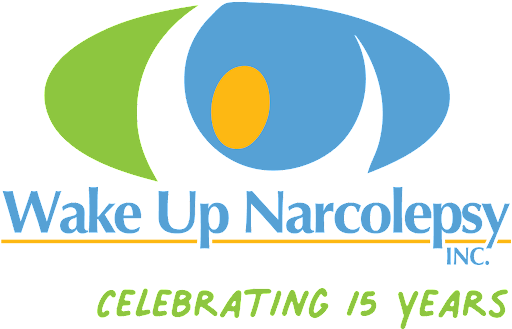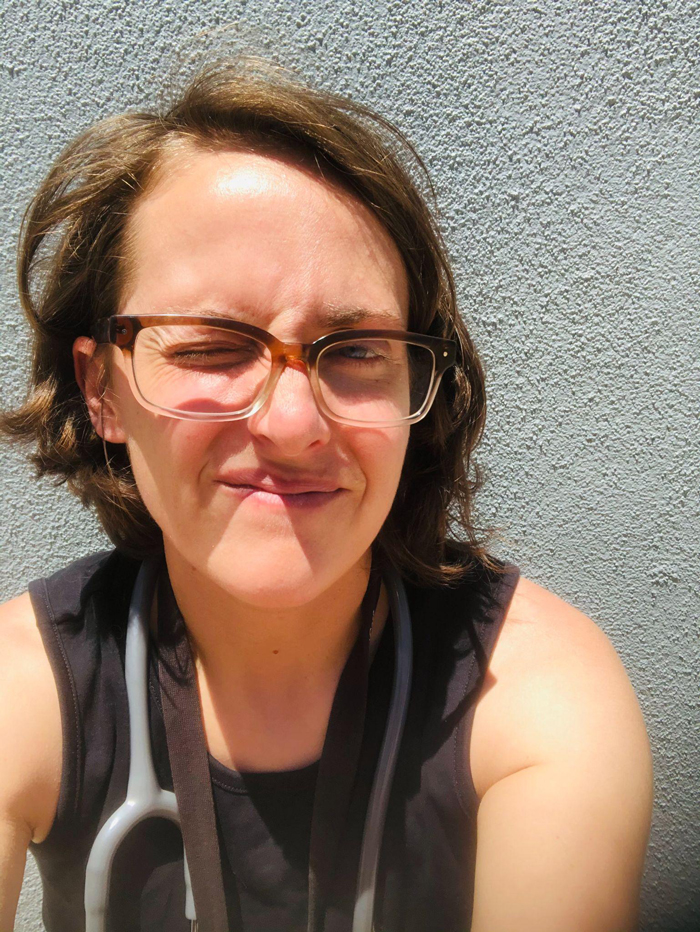Jan 10 2023
I Fall Down, by Frances Southwick
h in Voices of Narcolepsy
I’m a family medicine physician.
At age 33, twenty years after my first episode of cataplexy, I was diagnosed with type 1 narcolepsy.
The first episode I can remember was at age thirteen at summer camp. By campfire on the fifth night, we thirty-odd campers were bound by inside jokes, acoustic Christian singalongs and midnight TP parties. I sat on a backrow log with my new camp BFF witnessing fellow campers bravely stand and recount trauma stories. I wanted to take a bathroom break, but I couldn’t stand up. After the third story, my legs were shaking and I couldn’t stop them. At the dance the next night, tensions were high. I felt weak and dreamy. Reaching for the door to get outside for some air, my body buckled to the floor. We all called it ‘passing out’ which made me feel like a faker. . . because I hadn’t passed out. I could hear them talking, gasping, running. I could feel them moving me. The next morning, the camp nurse drove us to a rural emergency department an hour away. I skipped through the halls and giggled, bored. “Yes, she hit her head,” said the nurse. “Hmmmm, well, we could do a CT of the brain but she is acting normal now,” said the doc. At home, I told my mom in the laundry room. “I fell at camp. The doctor asked if I had heart problems, and I told them about my murmur.” She paused, tense, swiveled to me. “We had that murmur checked with a cardiologist, and it is innocent. Francie, I worry you are exaggerating.”
I was fifteen years old at the time of the Columbine Massacre. Our high school was holding its breath. Walking with my First Love after biology, I was also anxious and pitter-pattery. With each step, I was weaker, dreamier, and slower. I fell in the hall by the front desk. First Love sat by me while the hubbub spun around us. When the paramedics came, I cried and pleaded for them to not call my parents. They placed me in a hard cervical collar and carried me on a stretcher out of school. Riding in the ambulance, the lead paramedic demanded, “What did you take?!”
She believed I had taken a drug of some type, and I could not convince her otherwise. My father met us in Denver forty minutes later at the hospital. By that time, my legs were shaking. I still lay on the stretcher in the hard collar. “Stop that!” he said. I overheard my father and the doctor talking. After learning about my high grades and multiple clubs, she told him I had Imposter Syndrome. My father’s treatment for the episode was what he thought was right: a steak.
Episodes of cataplexy continued to occur over the years. Thinking back, they were approximately twice a year. Age eighteen in a seminar room while delivering a speech. Age nineteen outside Jared’s Jewelers after buying an engagement ring. Age 20 on a tarp while camping, when I first told Jude I love her. Age 22 in a medical school conference room when I was taking the part of lead doctor for the first time. Age 28 in a newborn nursery near a pediatrician I respected. Age 29 on the third floor of a hospital after a patient was angry with me. Age 31 on my therapist’s office floor.
Many visits to emergency departments, primary care providers, cardiologists, psychiatrists, therapists, and neurologists were had. Finally, in 2016, a keen neurologist in Pittsburgh sent me to a sleep specialist which led to a polysomnogram, a multi-sleep latency test, and the diagnosis clinch. The parts of the story I didn’t disclose to my doctors was a significant reason it took so long to get an appropriate diagnosis. I believed that I was being dramatic, causing the episodes, and should just bear whatever problems came along with these experiences. Strong emotions were stigmatized in my community and family, so when I experienced them, I entered a state of denial or dissociation. Even when I was able to mentally acknowledge the thread of highly emotionally activating situations as the trigger for my falling episodes, I carried heavy shame. I didn’t want to admit that I was awake for the episodes, and I didn’t want to admit that I had feelings. Working with therapists and neurologists over the years, taking medication, and surrounding myself with supportive people who accept me and all facets of my diagnosis has been critical to my daily functioning. I still have episodes of cataplexy on walks with my sister when we talk about difficult topics or make each other laugh too hard or too long. I sometimes get weak in my office at the end of my week, especially when I work with patients with highly emotionally stimulating conditions. A couple of years ago, three of the family medicine residents I had helped to train surprised us with gifts of gratitude, and I spent over an hour on the floor of the clinic. My most frequent trigger is love; when my nieces and nephews are super sweet to me, I’m a goner. For me, sleeping is a carefully curated experience. I plan out 8.5 hours of sleep. I get in bed before Judith, use Aquafor in my nose for optimal breathing, earplugs and an eye mask to reduce environmental stimulation which can increase fragmented sleep, and I sleep on my side on a wedge pillow to reduce the likelihood of sleep paralysis (sleep paralysis for me is much more common when I lay on my back). Work adjustments have helped reduce the frequency of work-related cataplexy. I live close to the office in case I need to be picked up early. I see patients Monday through Thursday to reduce the emotional load. My wife Judith usually drives me to and from work, and I plan work meetings at the beginning or middle of the week. Family time is on the weekends only, because if I get a sweet “You’re the best auntie ever, Frankie!” I am likely to have an episode of cataplexy. When I cataplex in the evening, I often have a long episode of sleep paralysis and prolonged cataplexy the following morning, which means Jude has to call my office and cancel my workday. For special occasions and known triggers, I plan ahead. I use a handicap hanging placard if I am likely to have cataplexy, and always have a backup plan of a family member to call in case I need to be picked up. I am seated through all special occasions. And my family reserves me the corner spot on the couch for Christmas.

